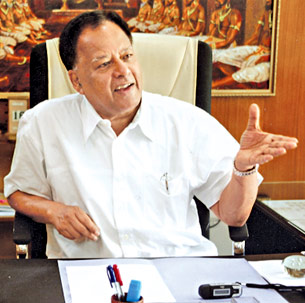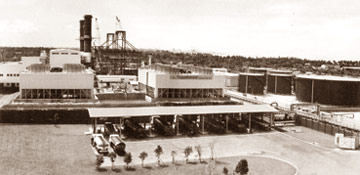|
Sri Lankan economy:
Challenges and opportunities
|

Dr. Sarath Amunugama
Pic: Shyarman Perera |
The global economy is in a crisis and Sri Lanka too is not immune and
the countryís economy is facing a hard time. The Minister of Public
Administration and Deputy Finance Minister Dr. Sarath Amunugama
explained the challenges faced by the country and opportunities emerging
with the liberation of the North and the East in an interview with our
staff correspondent Gamini Warushamana. Following are excerpts from the
interview.
Q: How crisis hit Sri Lanka?
A: There is a meltdown in the global economy. It started as a crisis
in the housing market in the US. But since the housing loans were
underwritten by many layers of banks, this crisis hit the US economy and
then through the problems of the banking system, it soon affected
European economy as well. Since we are living in a globally integrated
world the crisis in the West spread to the developing world, too.
Particularly the export industries of the developing countries have
been affected because demand in our main markets dropped resulting in a
price decline. Then export revenue dropped and finally financial sector
was affected creating a credit crunch and Balance of Payments (BOP)
crisis.
Sri Lanka has also faced a similar situation. Our revenue from tea
and other exports, tourism and foreign remittances have been declining.
On the other hand, the government has to pay the loans taken to finance
the high oil bill for imports during the oil crisis, especially a huge
differed payment facility given by Iran at that time.
Due to these factors Sri Lanka is also in a BOP difficulty. Not only
the oil bill, we have to pay for the import of arms and ammunition for
the war and consumer durables.
Also we have to finance counterpart funds for ongoing mega projects
which the host government has to pay such as freight, insurance,
logistics and transport costs.
Strength of the economy
Despite all these issues, the Sri Lankan economy has many strong
points. We have a strong domestic agricultural sector and we are self
sufficient in rice.
With the development in the North and the East we will be able to
increase our GDP by 1-2 percent. Our export sector has not collapsed and
we have the GSP+ concessions. The tea industry is still quite buoyant.
IMF bail out
What we are now trying to do is to get a standby arrangement facility
amounting to US$ 1.8 billion which the IMF offers. There is a big
misunderstanding, particularly among the Opposition and the media.
Normally the standard IMF bail out packages come with many conditions
and in the past, on many occasions Sri Lanka has obtained IMF
assistance.
However, this time this loan arrangement is different. Because at the
last IMF governors meeting which I attended the governors requested the
IMF to establish a special fund to help member countries to face the
economic downturn.
|

Kerawalapitiya powerhouse |
Therefore, this is a different window which is made available for
countries such as Sri Lanka. I donít anticipate any difficult
conditions. In any case IMF conditions are not something very strange.
All economists in Sri Lanka believe some of the IMF conditions are quite
rational and they help to develop our economy.
However, this is a different kettle of fish and this IMF standby
arrangement comes with very attractive terms with regard to interest
rates and the repayment period. This is a very concessionary loan
compared to bilateral and commercial loans, particularly the commercial
loans.
Opposition
But our Opposition is living in a fools paradise opposing and
creating problems. This IMF loan will stabilise the economy putting an
end to the last hope of the Opposition UNP.
The last hope of the UNP is that the economy will be in a mess and
that the financial sector will collapse. However, with this IMF
assistance the financial position and the economy will become stable.
Infrastructure development
The Mahinda Rajapaksa Government has invested in the development of
infrastructure at an unpresented pace. Today we know that without
developing infrastructure, there will be no investment and no economic
growth. For instance, one of the biggest problems of growth in Sri Lanka
was the non availability of power and high cost of electricity.
After more than 13 years of indecision, the government has now
launched the Norocholai coal power plant and it will be commissioned in
2010 and provide 300 MW to the national grid. Phase 2 of the project
will give another 300 MW. We commissioned Kerawalapitiya Project with
100 MW. Upper Kotmale Scheme was launched.
Uma Oya Development Project has started with funding from Iran. With
the passing of the new Electricity Bill hopelessly inefficient and
out-dated CEB will be reformed and much needed repairs and extensions to
the grid will be undertaken with ADB and JBIC funds.
In the port sector, Colombo South, Galle, Oluvil and Hambantota Port
Development Projects have commenced. In the transport sector, Colombo-Katunayake
express way has been launched.
Southern highway is completed from Kottawa to Galle. It will be
extended to Matara. Preliminary work of the Colombo-Kandy highway has
been undertaken. A9 and A32 roads have been reopened. In the Eastern
provinces many bridges and roads are being constructed.
Today the consumers enjoy the benefits of these infrastructure
projects. Prices of vegetables and fish have come down and the cost of
living is declining. All of a sudden the opposition UNP has stopped
talking about cost of living.
Due to all these positive developments today the UNP does not have
issues and now they are fighting with one another. There is no fight
with the government and Rukman attacks Ranil, Ranil attacks SB and so
on. The biggest energy is used to fight against one another. So how can
we get advice from them on the economy or politics?
FDI
In 2008, when I was the Minister of Investment Promotion, the BOI was
able to attract US$ 850 million FDI, the highest recorded foreign
investment in the country. In 2007, we obtained US$ 700 million FDI. If
the proposed oil refinery was started we would have got another US$ 1
billion last year and the project was postponed after the oil price
dropped sharply.
Future plan
Our future development plans must be focused on fully developing
resources. That is the main objective in the Mahinda Chintana policies.
Agricultural development will get the priority. We have to invest and
quickly increase milk, sugar and fish production. There is a substantial
growth in these areas. But we have a long way to go.
We have to develop Moneragala, Ampara and Kantale areas as sugar
growing areas. Today the Pelwatta sugar company pumps Rs. 1 billion per
month to the Monaragala district. If we can pump money to Ampara and
Trincomalee districts through the sugar industry it would boost these
rural economies and poverty will come down.
The UNP and the JVP oppose these sugar projects because they want
poverty to prevail because then only they can win elections. Thatís why
the JVP too opposes Moneragala sugar project.
As British colonials did the JVP too opposes the development of the
Moneragala district. British colonials opposed because it was a
rebellions area and the JVP think that if the area is developed they
will lose their political base. Today big agro industries such as sugar
projects need to go to Monaragala to boost this lagging region.
North and the East
Sri Lankaís future is quite bright with the liberation of the North
and East. We expect rapid development in agriculture, fisheries and
tourism sectors. We will invest money in these two provinces and examine
the possibility of establishing special economic zones to get GSP+ and
other concessions from our major markets.
Achieving development goals
Today the Western province is growing at a rate of 12-13 per cent
which is similar to that of China, India and Vietnam. To achieve similar
growth in other provinces we have to do several things.
Firstly, we should energise the public sector which is slow,
uncommitted and not working well. It has to be improved and motivated.
Public sector must learn to compete with the private sector.
Secondly, we must create an environment conducive for investment and
we must be more investor friendly.
Thirdly, We must look into our social welfare measures. Nowhere in
the world is everything offered free and sundry to all. In Communist
China the education above grade six should be fully paid by the parents
and in the university education every cent has to be paid by the people.
Knowing this the JVP opposes private universities. Concessions should
be given only to the needy people. Today more than 50 per cent of the
population get Samurdhi and many of them donít need that assistance. The
Samurdhi program has blocked the rural labour market.
Therefore it is very difficult to develop rural areas. Water, fuel
and electricity have been subsidised for all. Nowhere in the world
people use Jaguar or Mercedes with subsidised fuel or people own houses
with 30 rooms and 10 shower baths using subsidised electricity and
water. |


